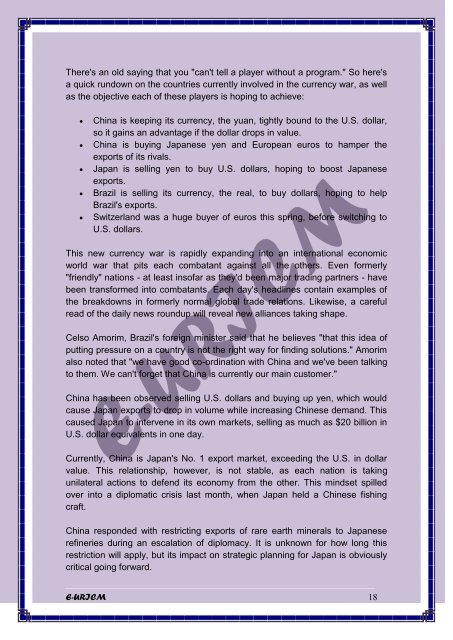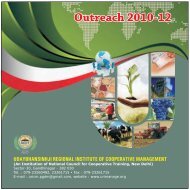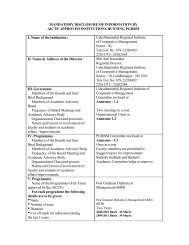URICM - UDAYBHANSINHJI - Regional Institute of Cooperative ...
URICM - UDAYBHANSINHJI - Regional Institute of Cooperative ...
URICM - UDAYBHANSINHJI - Regional Institute of Cooperative ...
Create successful ePaper yourself
Turn your PDF publications into a flip-book with our unique Google optimized e-Paper software.
There's an old saying that you "can't tell a player without a program." So here'sa quick rundown on the countries currently involved in the currency war, as wellas the objective each <strong>of</strong> these players is hoping to achieve:China is keeping its currency, the yuan, tightly bound to the U.S. dollar,so it gains an advantage if the dollar drops in value.China is buying Japanese yen and European euros to hamper theexports <strong>of</strong> its rivals.Japan is selling yen to buy U.S. dollars, hoping to boost Japaneseexports.Brazil is selling its currency, the real, to buy dollars, hoping to helpBrazil's exports.Switzerland was a huge buyer <strong>of</strong> euros this spring, before switching toU.S. dollars.This new currency war is rapidly expanding into an international economicworld war that pits each combatant against all the others. Even formerly"friendly" nations - at least ins<strong>of</strong>ar as they'd been major trading partners - havebeen transformed into combatants. Each day's headlines contain examples <strong>of</strong>the breakdowns in formerly normal global trade relations. Likewise, a carefulread <strong>of</strong> the daily news roundup will reveal new alliances taking shape.Celso Amorim, Brazil's foreign minister said that he believes "that this idea <strong>of</strong>putting pressure on a country is not the right way for finding solutions." Amorimalso noted that "we have good co-ordination with China and we've been talkingto them. We can't forget that China is currently our main customer."China has been observed selling U.S. dollars and buying up yen, which wouldcause Japan exports to drop in volume while increasing Chinese demand. Thiscaused Japan to intervene in its own markets, selling as much as $20 billion inU.S. dollar equivalents in one day.Currently, China is Japan's No. 1 export market, exceeding the U.S. in dollarvalue. This relationship, however, is not stable, as each nation is takingunilateral actions to defend its economy from the other. This mindset spilledover into a diplomatic crisis last month, when Japan held a Chinese fishingcraft.China responded with restricting exports <strong>of</strong> rare earth minerals to Japaneserefineries during an escalation <strong>of</strong> diplomacy. It is unknown for how long thisrestriction will apply, but its impact on strategic planning for Japan is obviouslycritical going forward.E-<strong>URICM</strong> 18





